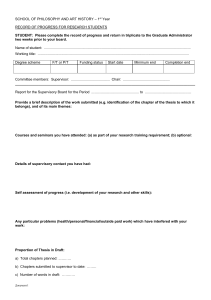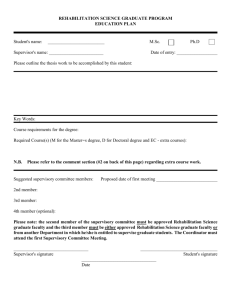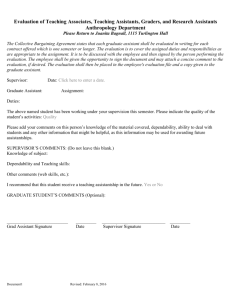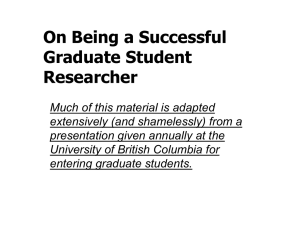Letter of agreement between graduate student and supervisor
advertisement
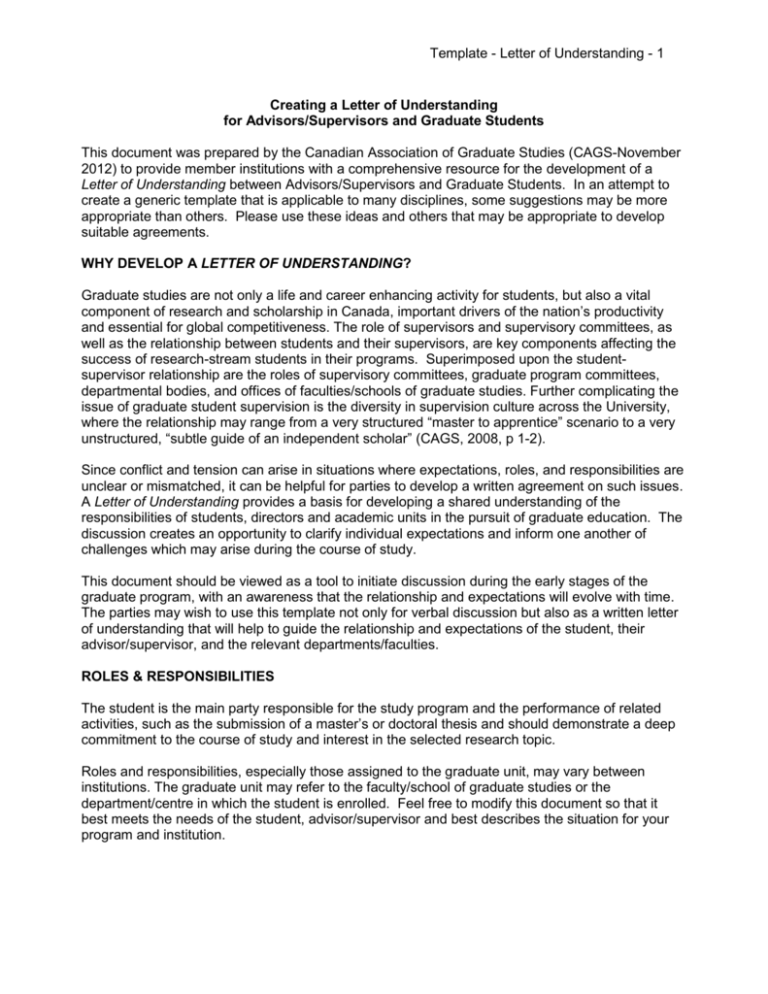
Template - Letter of Understanding - 1 Creating a Letter of Understanding for Advisors/Supervisors and Graduate Students This document was prepared by the Canadian Association of Graduate Studies (CAGS-November 2012) to provide member institutions with a comprehensive resource for the development of a Letter of Understanding between Advisors/Supervisors and Graduate Students. In an attempt to create a generic template that is applicable to many disciplines, some suggestions may be more appropriate than others. Please use these ideas and others that may be appropriate to develop suitable agreements. WHY DEVELOP A LETTER OF UNDERSTANDING? Graduate studies are not only a life and career enhancing activity for students, but also a vital component of research and scholarship in Canada, important drivers of the nation’s productivity and essential for global competitiveness. The role of supervisors and supervisory committees, as well as the relationship between students and their supervisors, are key components affecting the success of research-stream students in their programs. Superimposed upon the studentsupervisor relationship are the roles of supervisory committees, graduate program committees, departmental bodies, and offices of faculties/schools of graduate studies. Further complicating the issue of graduate student supervision is the diversity in supervision culture across the University, where the relationship may range from a very structured “master to apprentice” scenario to a very unstructured, “subtle guide of an independent scholar” (CAGS, 2008, p 1-2). Since conflict and tension can arise in situations where expectations, roles, and responsibilities are unclear or mismatched, it can be helpful for parties to develop a written agreement on such issues. A Letter of Understanding provides a basis for developing a shared understanding of the responsibilities of students, directors and academic units in the pursuit of graduate education. The discussion creates an opportunity to clarify individual expectations and inform one another of challenges which may arise during the course of study. This document should be viewed as a tool to initiate discussion during the early stages of the graduate program, with an awareness that the relationship and expectations will evolve with time. The parties may wish to use this template not only for verbal discussion but also as a written letter of understanding that will help to guide the relationship and expectations of the student, their advisor/supervisor, and the relevant departments/faculties. ROLES & RESPONSIBILITIES The student is the main party responsible for the study program and the performance of related activities, such as the submission of a master’s or doctoral thesis and should demonstrate a deep commitment to the course of study and interest in the selected research topic. Roles and responsibilities, especially those assigned to the graduate unit, may vary between institutions. The graduate unit may refer to the faculty/school of graduate studies or the department/centre in which the student is enrolled. Feel free to modify this document so that it best meets the needs of the student, advisor/supervisor and best describes the situation for your program and institution. Template - Letter of Understanding - 2 Academic Development It is the student’s responsibility to: Develop the necessary skills and learning approaches suitable for an advanced degree; Exhibit independent judgment, academic rigor, and intellectual honesty; Complete research, course work and/or thesis within the period that is typical for specific degree program; Give due consideration to workload and exercise care in the performance of the work assigned; Submit their material in a timely manner so as to receive an adequate assessment; Make timely progress towards completion of degree and spend the required number of hours carrying out research activities; Be available to complete the work assigned and reduce any time devoted to paid activities unrelated to their studies; Determine with the assistance of the advisor/supervisor, a yearly renewed or revised collaboration/study plan (or more frequently if the need arises). It is the advisor/supervisor’s responsibility to: Ensure that the student’s master’s or doctoral thesis is suitably aligned with the number of credits awarded and that the project is manageable with respect to the educational program objectives and the time allocated for the completion of the program; Ensure that student’s project has an appropriate hypothesis/question and achievable goals; Assist the student in developing their research interests and help the student modify the program when unforeseeable problems arise; Determine how and when the supervisory committee should be formed; Provide the student with suitable resources and work space; Provide supervision in a way which leaves the student with room for autonomy (especially for doctoral students); Provide timely feedback to thesis drafts and writings submitted by the student in accordance with an agreed upon schedule; Be open, honest and fair with the student when academic performance is not meeting expectations; Provide appropriate mentorship and guidance; Establish with each student a yearly renewed or revised collaboration/study plan (or more frequently if the need arises). Template - Letter of Understanding - 3 It is the graduate unit’s responsibility to: Have procedures in place to connect students and potential supervisors, and to allow and/or ensure a change in supervisor in the unlikely event that this becomes necessary; Provide mechanisms to assist students with selection of a supervisor and with major program milestones such as the beginning of research or thesis writing. Examples include: assigning senior graduate students as mentors; arranging for a temporary faculty advisor if choice of supervisor is not immediately available and workshops on healthy supervisory relationships. Advocate for and work with other departments at the university to ensure adequate resources such as Library, writing resources, computer labs, and space, are available to support the student in fulfilling their program requirements. Communication It is the student’s responsibility to: Meet regularly/weekly/monthly (as determined) with advisor/supervisor and advisory/supervisory committee to report on research progress and to meet deadlines, in compliance with established program terms; Provide the advisor/supervisor with a written report to allow time for review and comment before meeting; Hold face-to-face meetings with advisory/supervisory committee at least once per year, but preferably every six months and provide a progress report and future plans to the committee at least a week in advance of meetings; Participate in departmental meetings, seminars and training regularly as determined with advisor/supervisor; Attend meetings to assess the performance of their study program, more specifically with respect to the preparation and submission of his or her master’s or doctoral thesis. It is the advisor/supervisor’s responsibility to: Meet regularly/weekly/monthly with the student to provide guidance, assess progress and assist student in the goal of completing the program on time; Monitor the accuracy, validity, and integrity of student’s progress and respond in timely manner with comments/revisions to drafts of applications, reports or research presentations; Meet with the student to discuss specific provisions related to their course of study, especially regarding intellectual property and financial support; Ensure that the student is aware of relevant policies and procedures for the conduct of research; Assist the student in the presentation of their work as it progresses, in accordance with preset program parameters; Be available to meet with the student and at the student’s request to provide support to the student towards the progress and completion of the program; Template - Letter of Understanding - 4 Make arrangements to ensure the continuity of supervision during leaves or extended periods of absence. It is the graduate unit’s responsibility to: Make available through appropriate media clear and understandable information about program requirements, regulations and procedures, the faculty and staff responsible for the graduate program and graduate faculty members and their areas of research expertise; Ensure that approved supervisory committees are established by the appropriate deadlines; Ensure that the student’s supervisory committee meets at least once a year with the student, that this meeting is substantive, and that a written report of this meeting containing sufficiently useful detail is given to the student and filed in the official student file with the graduate unit. Interpersonal and Professional Conduct It is the student’s responsibility to: Be receptive to any advice or suggestions given by the supervisor/advisor or other faculty member involved in their education; Interact with fellow students, both graduate and undergraduate, staff and faculty in a professional and mature manner; Seek assistance from the advisor/supervisor especially making important decisions about the course of study or while looking to define or redirect their master’s or doctoral thesis project; Advise the advisor/supervisor, in a timely manner, of any issues arising throughout the course of his or her program (difficulties of integration, learning or financial issues, selection of courses, availability of the advisor/supervisor, absence or delay in feedback material concerning their work or any other difficulty related to his or her supervision framework); Advise the advisor/supervisor, in a timely manner, of any foreseen prolonged absence and negotiate amount of time and timing of holidays; Be aware of policies and rules and regulations in effect at the university as well as any communications which may be directed to them. It is the advisor/supervisor’s responsibility to: Establish a professional working relationship to guide the student in their approach to research; Guide the student in learning to work independently and as a member of a team; Implement a plan of action to help overcome any unforeseen difficulties; Advise students concerning the preparation and submission of their master’s or doctoral thesis or drafting of scientific papers; Template - Letter of Understanding - 5 Maintain good professional and personal relationships with trainees in the research group and treat all members of the laboratory (and their work) with verbal and intellectual respect; Avoid personal or business relationships that may constitute a conflict of interest; Give credit in an appropriate manner to graduate student contributions to scholarly activity, whether presented at professional meetings, publications, or in applications for grants. It is the graduate unit’s responsibility to: Provide mechanisms for resolving problems that may arise between graduate students, supervisors, and/or members of the supervisory committee. Funding Considerations Graduate student support may come from a variety of sources such as Graduate Teaching Assistantships, scholarship funding from the Faculty of Graduate Studies, internal and external scholarships and bursaries as well as research funds acquired by the advisor/supervisor (designated as Research Assistantships). The Letter of Understanding should outline the level of support and the period during which financial assistance is provided. The stipend schedule should also be defined. It is the student’s responsibility to: Seek Graduate Teaching Assistantships/Research Assistantships to gain teaching experience at the direction of his or her supervisor; Apply for scholarships appropriate to program of study. It is the advisor/supervisor’s responsibility to: Provide consultation about scholarship and bursary applications in advance in order to look at ways of optimizing the student’s chances of success. Safety Different programs have various safety course requirements and training needed. It is the student’s responsibility to: Complete the required safety courses (e.g., Workplace Hazardous Materials Information System (WHMIS), the New Employee Health and Safety Orientation and Laboratory and Environmental Waste Management Safety training); Pass the appropriate courses on the use of animals in research (if applicable). Template - Letter of Understanding - 6 It is the advisor/supervisor’s responsibility to: Assist the student in determining the level of training and course(s) required for their study program; Make every reasonable effort to ensure that student’s learning and research environment is safe and adequately supported. Laboratory Etiquette and Computer Use It is the student’s responsibility to: Keep space tidy, respect the space of others, clean glassware, and participate in periodic laboratory cleanup; Understand that space and equipment is shared and that care must be exercised with problems reported as they arise; Refrain from borrowing the supplies of others and removing items from the laboratory without permission; Maintain good professional and personal relationships within the research group and treat all members of the laboratory (and their work) with verbal and intellectual respect; Maintain daily records of laboratory notes, including printed records of primary data and use their data as the basis for weekly meetings; Leave laboratory books and primary data within the department (or if signing out use a predetermined process); Use laboratory computers for research purposes only (e.g., email, data analysis, literature searches and other forms of scientific communication). Publications and Intellectual Property Individual institutions will have varying policies and procedures regarding publications and intellectual property. As such, please review this information as it pertains to your academic unit and school. Students and advisors/supervisors are encouraged to enter into an agreement regarding intellectual property early in the program to determine how these issues will be addressed, should they arise. Refer to the policies at your institution. It is both the student and advisor/supervisor’s responsibility to: Present research results that are publishable in reputable, externally refereed journals, thereby achieving the goals of creating new knowledge and reporting it to the appropriate community; Determine an authorship process for shared and non-shared authorship and identify the importance of first authorship for the student; Recommend timely completion and publication of manuscripts before completion of the program to facilitate preparation of thesis; Publish the findings from the research. Agree that if original research is carried out by students, the intellectual property component may wholly or in part belong to the student; Maintain appropriate confidentiality concerning research activities, in accordance with existing practices and policies of the discipline. Template - Letter of Understanding - 7 Professional Development It is both the student and advisor/supervisor’s responsibility to: Work together to find opportunities for students to attend suitable conferences and present research findings and seek funding sources for associated travel costs. It is the supervisor/advisor’s responsibility to: Encourage participation in non-academic programs for professional development, such as effective writing courses, teaching training programs, conflict resolution and workshops on research grants. It is the graduate unit’s responsibility to: □ provide and/or inform the student of workshops or presentations that will support their professional skills development. __________________________________ Supervisor ___________________________ Date __________________________________ Graduate student ___________________________ Date

